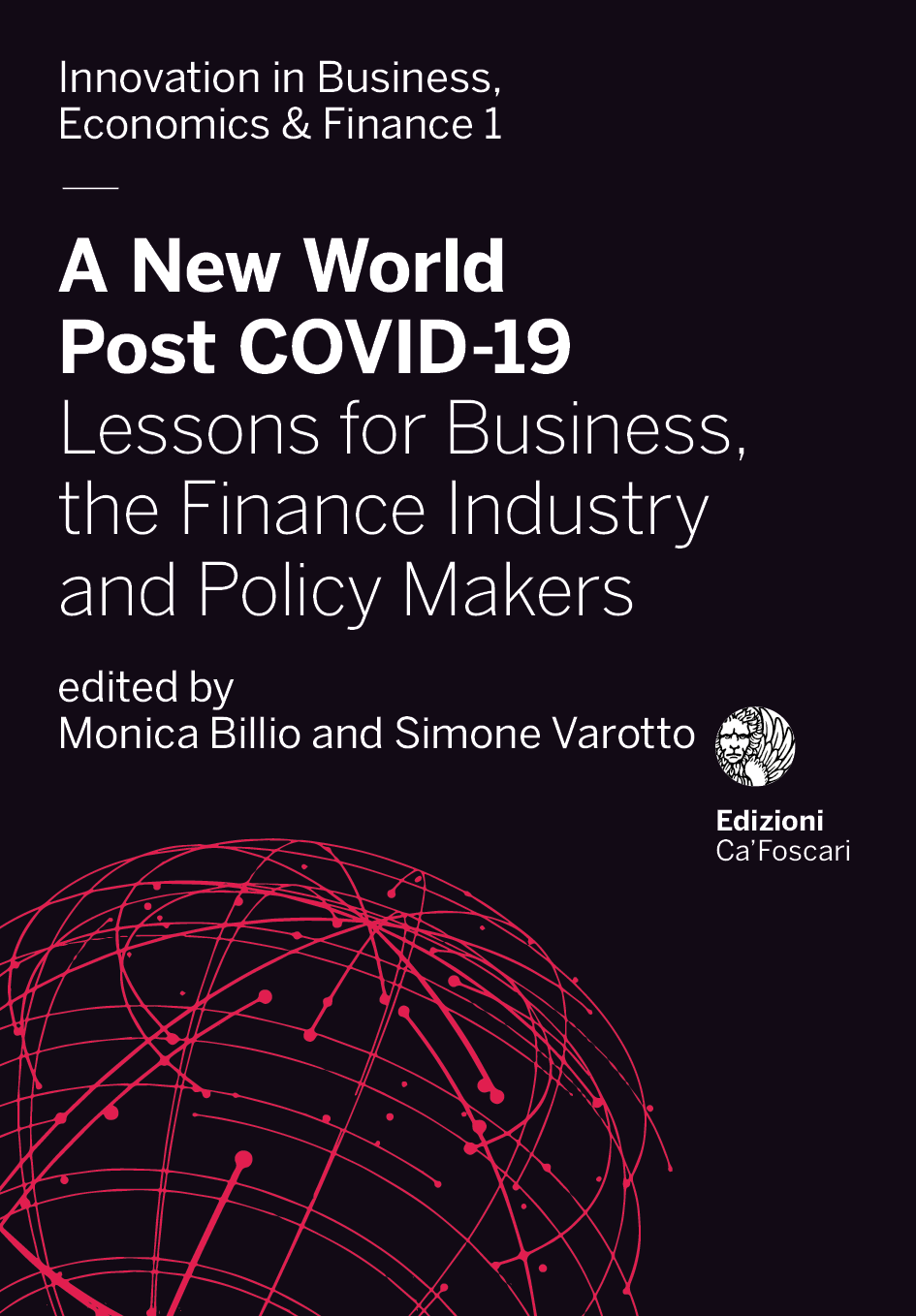
- search 4651 views
- file_download 1613 download
- keyboard_capslockmetadata
- How to cite
-
mark_email_readIscriviti alla newsletter
A New World Post COVID-19
Lessons for Business, the Finance Industry and Policy Makers
a cura di
abstract
Pandemics are disruptive events that have profound consequences for society and the economy. This volume aims to present an analysis of the economic impact of COVID-19 and its likely consequences for our future. This is achieved by drawing from the expertise of authors who specialise in a wide range of fields including fiscal and monetary policy, banking, financial markets, pensions and insurance, artificial intelligence and big data, climate change, labour market, travel, tourism and politics, among others. We asked contributing authors to write their chapters for a non-technical audience so that their message could reach beyond academia and professional economists to policy makers and the wider society. The material in this volume draws from the latest research and provides a wealth of ideas for further investigations and opportunities for reflection. This also makes it an ideal learning tool for economics and finance students wishing to gain a deeper understanding of how COVID-19 could influence their disciplines.
-
Keywords keyboard_arrow_down
Pensions • Pension transfers • Artificial intelligence • Decision-making • Investment banking • Black Death • COVID-19 crisis • Employment • European repo market • Solvency 2 • Interest Rates • ECB announcements • Internal migration • Pension contributions • Labour market • Market risk • Central Bank • Great Depression • ECB • Incentive compatibility • Debt • Dynamic Capabilities • Resilience • Oil prices • Private equity • Austerity • Industry sectors • COVID-19 pandemic • Energy demand • Protectionism • Travel • Covid-19 • Bank risk • Bank of England • Home production • Fiscal inequality • Bank default • Corporate investments • Far right parties • Gold • Virtual tourism • Altcoin • Fiscal policy • Soccer • Public debt sustainability • Regulation • COVID-19 • Real Estate • Recovery • Solvency ratio • Lockdown • Spillover effects • Treasury • Local credit • Commercial • Climate change • Childcare • Economic recovery • Populism • Market risks • Green Deal • Ambiguity • Pandemics • Unemployment • Coronavirus • Beta • Trade • Zombie lending • Sports Economics • Italy • Flight-to-quality • AI • Pension withdrawals • Measurement • Equity market performance • Digital transformation • Credit default risk • Recovery policy • Xenophobia • Sports Finance • Informal economy • Brain circulation • Festivals • Repo specialness • Policy complementarity • Pay • Basel • Venture capital • Tail risk • Fiscal Policy • Country risk • State pensions • Portfolio Optimization • Future of Work • Travel barriers • High growth enterprises • Pension scams • Data interface • Technology impact • Growth • Public policy distortions • Skills • Start-ups • Sports Management • Political uncertainty • Non-macro-related uncertainty • Political economy of policymaking • Revenues • Technology • Investment • Economic History • Energy supply • Cryptocurrency • Expected Shortfall • Residential • Bitcoin • Talent mobility • CAPM • Value-at-Risk • Pandemic • Sovereign Yields • Quantitative Easing • Longevity • Volatility • Oil markets • Fund raising • Tourism • Mergers • Alternative data • Technology in pandemic • Financial crisis • Mortality • OPEC • Acquisitions • International researchers • Gender • Data analytics • Business interruption risk • Stock markets • Collaboration • Careers
Sommario
- search 152 view
- file_download 19 download
Part 1. Historical Perspective
- search 567 view
- file_download 100 download
- search 491 view
- file_download 18 download
Part 2. Fiscal and Monetary Policy
- search 235 view
- file_download 6 download
- search 624 view
- file_download 90 download
- search 334 view
- file_download 29 download
Part 3. Banking, Risk and Regulation
- search 487 view
- file_download 71 download
- search 462 view
- file_download 17 download
Part 4. Financial Markets
- search 314 view
- file_download 33 download
- search 286 view
- file_download 17 download
- search 362 view
- file_download 40 download
- search 293 view
- file_download 25 download
Part 5. Commodities and Real Estate Markets
- search 271 view
- file_download 14 download
- search 362 view
- file_download 38 download
Part 6. Business Performance, Funding and Growth
- search 332 view
- file_download 34 download
- search 338 view
- file_download 74 download
- search 349 view
- file_download 16 download
Part 7. Pensions and Insurance
- search 353 view
- file_download 26 download
- search 370 view
- file_download 26 download
Part 8. Climate Change
- search 637 view
- file_download 36 download
- search 307 view
- file_download 21 download
Part 9. Labour Market
- search 361 view
- file_download 30 download
- search 239 view
- file_download 9 download
- search 216 view
- file_download 11 download
- search 412 view
- file_download 64 download
Part 10. AI and Big Data
- search 269 view
- file_download 21 download
- search 240 view
Part 11. Travel, Tourism and Entertainment
- search 232 view
- file_download 18 download
- search 528 view
- file_download 108 download
Part 12. Politics: Protectionism and Populism
- search 221 view
- file_download 5 download
- search 392 view
- file_download 40 download
